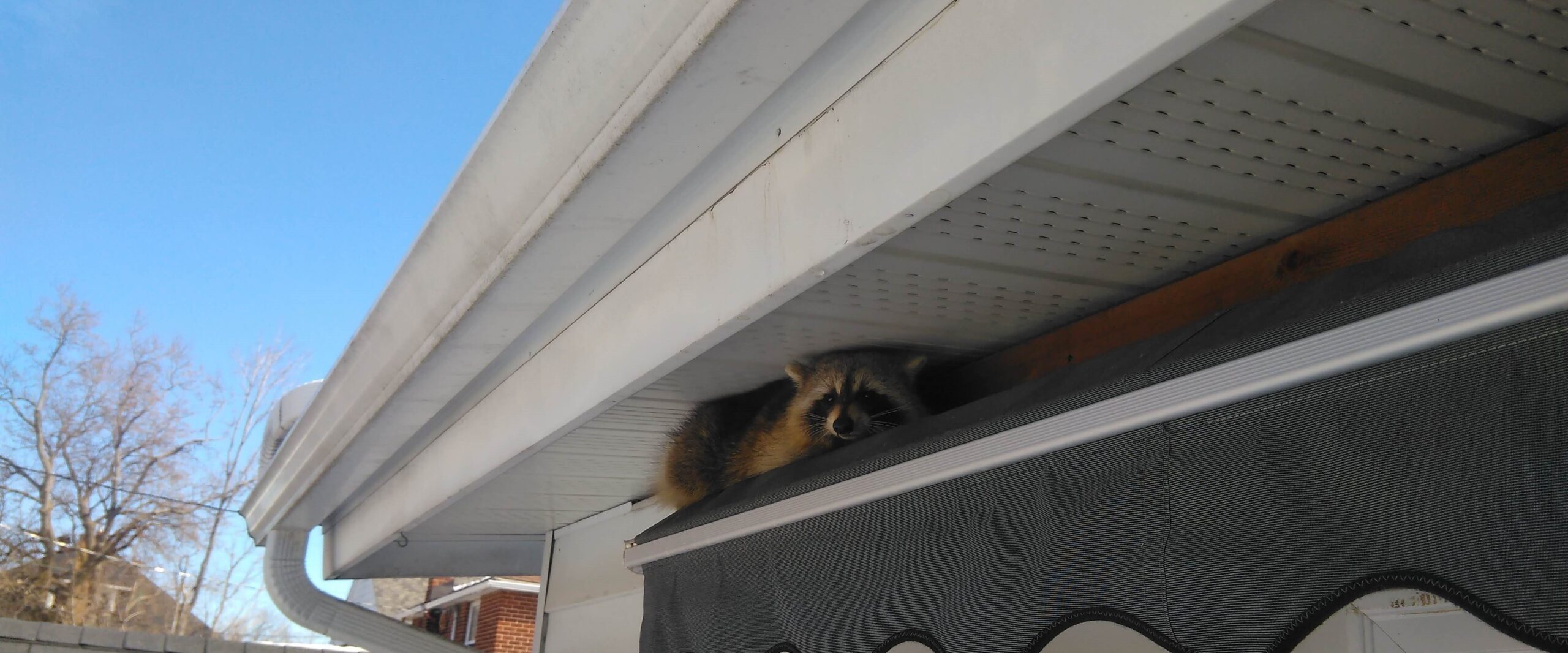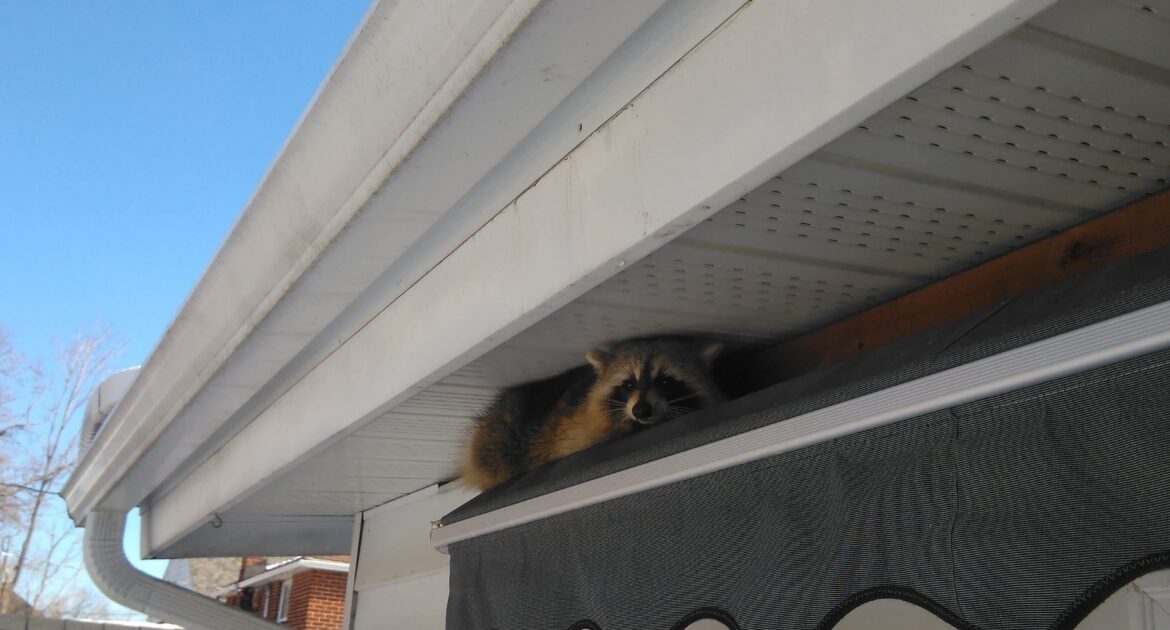You might think the idea of raccoons opening doors sounds like a funny story. But if you live in Barrie or another city where these animals thrive, it’s not a joke. Raccoons are incredibly smart, curious, and surprisingly strong. They have adapted to urban life in ways most people never expect.
So, could a raccoon open your door and get inside? The short answer is yes, in some cases. Our experts at Skedaddle Humane Wildlife Control in Barrie explain how this happens, why raccoon adaptability in urban areas makes them so resourceful, and what you can do to prevent raccoon entry points around your home.
Below, we answer the most common questions people ask us about raccoons opening doors and finding ways indoors.
1. Can Raccoons Really Open Doors?
Yes, raccoons can open doors, especially if they are not tightly secured. Their paws work a lot like hands, with sharp claws that help them grip and twist. If you’ve ever struggled with a stubborn doorknob, imagine how determined a raccoon can be when it’s hungry or searching for shelter.
They don’t succeed every time, but with enough persistence, some of these animals can push through weak latches, swing open screen doors, or pull on sliding doors. Homeowners in Barrie are often surprised at just how far raccoons will go to get inside, which is why every latch and lock matters.
2. Why Are They So Good at Problem-Solving?
Raccoons are among the smartest animals in urban areas. Research shows they can remember solutions to puzzles for years. Their intelligence is one of the main reasons raccoon adaptability in urban areas is so high.
They know how to lift garbage bin lids, open containers, and even figure out how to climb into attics or garages. If a raccoon notices a door that isn’t closed tightly, it won’t take long before it tries to test it. This mix of memory, curiosity, and persistence makes raccoons tough to keep out without professional prevention.
3. What Makes Them Interested in Doors?
Doors are attractive to raccoons for a few reasons:
- Food Smells: Cooking odours can drift outside, drawing raccoons right to your entryways.
- Shelter: A closed door often hides a warm and safe spot inside.
- Curiosity: Raccoons are naturally curious and will test objects in their path.
For a hungry or cold raccoon, your door might seem like the perfect challenge. They don’t view a door as a barrier—it’s simply another puzzle to solve. This is why raccoons opening doors is more common than people realize.
4. Do They Target Certain Types of Doors?
Yes, some doors are easier for raccoons to push or pull:
- Sliding glass doors left unlocked.
- Screen doors with weak latches.
- Basement or garage side doors with loose frames.
If these doors are located near garbage bins, compost piles, or pet food, the chances of raccoons opening doors goes up. Once they figure out a weak entry point, raccoons will return to test it again, which is why reinforcing these doors is a key step for prevention.
5. How Strong Are Raccoons?
You might be surprised at how strong raccoons are. Adults can weigh up to 30 pounds, and they use that strength to pry open lids, push against doors, or lift objects. Even when tired or cold, they don’t give up easily.
This strength, combined with their smarts, explains why preventing raccoon entry points is so important for homeowners in Barrie. Even a small gap or weak latch could give a determined raccoon the chance it needs. Once inside, their strength also means they can cause damage quickly, overturning bins or pulling down insulation.
6. Do They Only Try Doors at Night?
Most raccoons are active at night, which means that’s when they usually test doors and windows. If you hear scratching, thumping, or the sound of something bumping against your door at night, it could be a raccoon.
However, in urban areas, raccoons are becoming more comfortable being out during the day. That adaptability is one reason raccoon encounters are more common in cities like Barrie. Seeing one in daylight doesn’t always mean it’s sick—it may simply be adjusting to the busy human schedules around it.
7. Could They Get Inside Through a Pet Door?
Yes, pet doors are one of the easiest ways for raccoons to enter a home. If your dog or cat has a door that isn’t secured at night, these animals may crawl through in search of food. They see a pet door as an open invitation.
We’ve seen cases where raccoons got inside kitchens, raided pet food bowls, and caused major messes. Blocking pet doors at night or using secure options is key. Otherwise, raccoons may keep returning, knowing they can get an easy meal without much effort.
8. What Happens If They Get Inside?
Once inside, raccoons can cause serious problems. They may:
- Knock over garbage bins.
- Rip into food packaging.
- Leave droppings behind.
- Damage furniture or walls while searching for shelter.
Because raccoons can carry diseases like rabies or parasites in their waste, having one inside your home is more than an inconvenience—it’s a health risk. Families often face both property damage and cleanup challenges after a raccoon break-in. The sooner you deal with the issue, the less costly and stressful it becomes.
9. How Can You Prevent Them From Testing Your Doors?
Prevention is always the best solution. Here are a few key steps:
- Lock all doors and windows at night.
- Check that sliding doors and screen doors have sturdy latches.
- Keep garbage bins secured and away from entrances.
- Seal gaps in garage and basement doors.
These small steps go a long way in making your home less appealing to raccoons. While raccoons opening doors is possible, a home that’s properly secured gives them fewer chances to succeed. Prevent raccoon entry points before they ever become a problem.
10. What Do Experts Recommend for Long-Term Prevention?
At Skedaddle Humane Wildlife Control, we recommend focusing on the bigger picture. Raccoons are clever and adaptable, which means you need more than just locking doors. Simple fixes help, but lasting solutions require full inspections and proper sealing.
Our team inspects homes for weak points, secures areas raccoons often target, and installs one-way doors where needed. These allow animals to leave safely but stop them from coming back in. By combining humane removal with prevention, you can stop future break-ins before they happen and keep your home in Barrie raccoon-free.
The Bigger Lesson: Raccoon Adaptability in Urban Areas
The fact that raccoons are smart enough to test and sometimes succeed at opening doors shows just how well they’ve adapted to city life. In Barrie and beyond, these animals thrive because our homes, yards, and garbage provide everything they need.
That’s why prevent raccoon entry points is not just about comfort—it’s about protecting your property, your family, and your peace of mind.
Keep Raccoons Outside Where They Belong
Raccoons opening doors may sound like a myth, but it’s something we see in Barrie and other cities all the time. Their strength and intelligence show just how far raccoon adaptability in urban areas has come.
The best way to stay protected is to prevent raccoon entry points before they ever get inside. At Skedaddle Humane Wildlife Control in Barrie, we use proven, humane methods that work long-term.
Request an estimate today to learn how we can help keep your home safe from raccoons and stop problems before they start.




